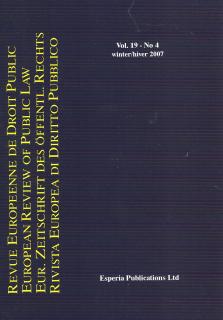
The Jurisdiction of the Administrative Courts
in Greece over Cases of State Liability
for Breach of EC Law by Public Authorities
Dimitrios Raikos
Justice in the Administrative Court of Appeal, Assistant Professor in Administrative Law,
Faculty of Law, Democritus University of Thrace,
Vice-President of the European Association of Administrative Judges
The principle that individuals must be able to obtain compensation for a breach of EC Law attributable to a Member State is of paramount importance for the implementation and effectiveness of EC Law. The core of the relation between EC Law and national legal systems, with regard to the substantive and procedural terms for claiming damages, lies in that the rules of the domestic legal system of each Member State must not be less favourable than those governing similar domestic actions (the principle of equivalence) and not render virtually impossible or excessively difficult the exercise of rights conferred by Community law (the principle of effectiveness). By contrasting the Greek legal framework of the rules of State liability and that of EC Law, it can be ascertained that the substantive terms for establishing State liability and awarding damages are more favourable in national law than those flowing from the case law of the Court (ECJ). Nevertheless, some questions are raised with regard to the compatibility to EC Law of the procedural way in which the competent administrative court takes into consideration the violation of EC Law. The first is connected to whether it is for the administrative judge to put forward a breach of EC Law of his own motion in the context of an action for damages against the State. The second refers to who bears the burden of proof of establishing the substantive conditions of State liability for the suffered damage and what the implications are if this burden is not discharged in accordance with the law.





















